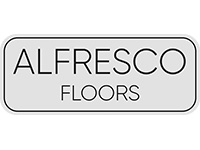When it comes to specifying balcony flooring, compliance with building and fire regulations is essential.
Alfresco Floors have discussed a range of important balcony flooring regulations, but it’s important to get refreshed.
In this blog, Alfresco Floors highlights some dos and don’ts that should make your balcony flooring projects the best they can be.
BALCONY FLOORING DOS
DO USE CLASS-A RATED BALCONY FLOORING MATERIALS
Defined by the Building Regulations For Fire Safety and Safety Approved Document B combustible materials are banned for use as they are proven to aid in the spread of fire.
This means that using Class A fire-rated materials is a legal requirement on all high-rise residential building’s balcony flooring projects over 18 metres. In fact, most architects and specifiers are considering the use of these materials on any building with multiple floors.
There’s a range of compliant materials that meet this classification. From aluminium decking to more natural choices such as porcelain, when combined with suitable non-combustible sub-frames, whatever aesthetic you require there will be a Class A option for you.
DO CONSIDER THE ENVIRONMENTAL IMPACT OF YOUR BALCONY
Environmental concerns are continuing to grow, and the entire construction industry is looking for ways to reduce its emissions and its reliance on carbon.
From the largest construction undertakings such as HS2 or Crossrail to smaller domestic projects, all specifiers are looking at ways of reducing carbon. When considering balcony flooring, you should be thinking about materials that help boost your green credentials.
Materials such as composites, as well as things such as aluminium, are manufactured using recyclable materials, helping to reduce the amount of CO2 used in the project.
DO CONSIDER SLIP RESISTANCE
With over 40% of injuries to the public coming from slips and trips, you want peace of mind that you’ve done everything in your power to limit the risk faced to those using your balcony flooring project.
This means that you need to consider what slip potential different balcony flooring materials have. Testing should be done on all flooring materials, by independent testing bodies who ensure materials meet the British Standards S7976-2 slip testing through the pendulum test.
With a wide range on offer through Alfresco Floors, materials such as composites, aluminium and porcelain have all been manufactured to ensure high levels of slip resistance.
tes
If you’re interested in finding out more, speak to the Alfresco Floors team or read more about slip resistance for balconies.
BALCONY FLOORING DON’TS
With a list of things to consider for your future balcony flooring projects, there are also some things that you need to avoid. Here are some things that could affect your balcony flooring project.
DON’T USE COMPONENTS THAT AREN’T FIRE RATED
When it comes to the fire rating of your balcony floor project, you might think you only need to worry about the combustibility of the flooring itself.
But that’s not the case.
The standards are clear that all components of the balcony (or specified attachment) should be Class A1 or A2 fire-rated).
If the sub-frame that you use such as a pedestal or rail system (and minor components of these, such as spacer tabs), does not meet the specified fire rating, it can have a negative impact on your project.
There are good fully A-rated options now available, and even price is no longer an issue, so there is no longer any excuse for using ‘almost compliant’ systems.
DON’T USE SUBSTANDARD SUB-FRAMES
Is your sub-frame technical enough to deal with site-specific issues? Think about the challenges of the site and your design, and ensure that the support system has the right features for your project.
Whether you need superior strength to deal with heavy pavers or commercial footfall, millimeter-precise slope correction to correct (or create) inclines, or the back up of a great technical team to assist you once on site, Alfresco Floors have many options for your A-rated project.
Another factor to consider is the depth of your balcony void; surprisingly low voids are more difficult to deal with than big voids. Alfresco Floors have systems starting at 26mm – call them for more information.
CONCLUSION
Considering the above should help make approaching projects much more straightforward.
In the past several years, regulation surrounding balcony flooring has changed so dramatically that it can be difficult to keep on top of, but in sticking to what has been discussed, you won’t go far wrong.
If you’d like to speak to a member of Alfresco Floors' expert team and find out what options you have, then feel free to get in touch today.
Balcony Flooring – The Dos and Dont's
| T | 020 8977 0904 |
|---|---|
| 020 89770904 Tech Dept. | |
| E | info@alfrescofloors.co.uk |
| W | Visit Alfresco Floors's website |
| Alfresco's E-Book | |
| Unit 6, Teddington Business Park, Station Road, Teddington, Middlesex, TW11 9BQ |
Categories
Balcony decking Balcony decking, composite materials Balcony decking, plastic Balcony decking, recycled material Decking support systems, external landscape Decking, external landscape, anti-slip surface Decking, external landscape, composite materials Decking, external landscape, recycled material Structural floor systems, decking

